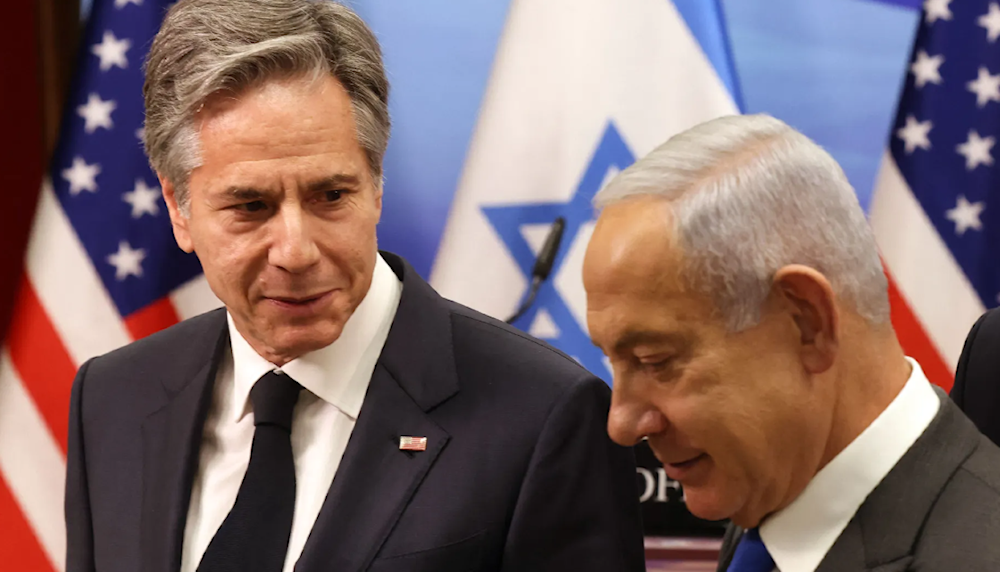US voices much concern about possible Israeli invasion of Rafah: Axios
More than a million Palestinians, many of whom have been displaced from other parts of Gaza, live in Rafah and the neighboring regions along the Gaza-Egypt border.
-

US Secretary of State Tony Blinken and Israeli Prime Minister Benjamin Netanyahu in Jerusalem on Jan. 30, 2023. (AFP)
United States Secretary of State Antony Blinken expressed deep concern about a possible Israeli expansion of aggression into the southern Gazan city of Rafah, Axios reported, citing an Israeli official and source briefed on the matter.
Blinken held a meeting with Israeli Prime Minister Benjamin Netanyahu and Security Minister Yoav Gallant on Wednesday where he communicated the worries.
More than a million Palestinians, many of whom have been forcibly displaced from other parts of Gaza, live in Rafah and the neighboring regions along the Gaza-Egypt border, knowing that Rafah was referred to by the UN last week as a "pressure cooker of despair."
The US is concerned about even more civilian casualties in the Palestinian population and is worried that such an operation will lead to the displacement of thousands of Palestinians into Egypt, something Egypt has categorically rejected and repeatedly warned against.
The Popular Front for the Liberation of Palestine (PFLP) held the US administration and the international community responsible for the serious consequences of any ground Israeli invasion of the city of Rafah in the southern Gaza Strip.
The Resistance group's statement came amid reports of a potential close Israeli military attack on the city as part of plans to completely cut off Gaza by occupying the Philadelphi Axis; a 14 km narrow strip of land that separates Palestine from Egypt.
In a statement released on Tuesday, the PFLP stated that "the US administration and the international system, by participating in the Zionist genocide war and aligning with the occupation's crime of forcing hundreds of thousands of our people to flee to Rafah, are contributing to committing an unprecedented war crime by creating the world's largest densely populated 'ghetto'."
Israeli officials, once again, claimed their goal was to dismantle Hamas strongholds in Rafah, though they have yet to make any true progress in the rest of the Gaza Strip, aside from murdering thousands of civilians.
Sources told Axios that during the discussion, Blinken raised worry over communication breakdowns between Israeli occupation forces (IOF) and foreign organizations, as well as poor deconfliction, which resulted in the targeting of UN staff bringing supplies.
Blinken once again addressed the seriousness of supporting a Palestinian state, explaining "the urgent need to de-escalate tensions in the West Bank and prevent the conflict from expanding."
On his end, the UN Secretary-General Antonio Guterres cautioned that if "Israel" pushed its invasion into Rafah, where "thousands of Palestinians have been squeezed in a desperate search for safety," there would be "untold regional consequences."
The Resistance is ready to protect its people
During the first months of the war on Gaza, the occupation entity designated Khan Younis and Rafah as "safe areas", ordering Palestinians living in northern Gaza to move toward the cities, along other areas south of the Strip.
However, as the aggression continued, Khan Younis later became the center of Israeli attacks and has remained so for almost two months now, and Rafah continued to be regularly bombed, leading to dozens of massacres, including several attacks on the city's crossing to prevent aid trucks from moving into Gaza from Egypt.
In that regard, the PFLP emphasized that the Israeli occupation is seeking to escape its successive defeats in the areas it invaded by land and the significant losses it has incurred in terms of soldiers and equipment.
"[Israelis] have failed to achieve any military objectives or accomplishments on the ground, despite propagating the false claim of 'completing the cleansing of resistance pockets and achieving field achievements in Khan Younis, the central region, Gaza, and the north,'" the group said.
Reaffirming the Resistance's constant state of readiness to defend its people, the Front declared that "the resistance in all its military branches in Rafah is ready to confront any Israeli ground invasion of the city" and affirmed that "as always, it would turn the alleys, camps, and streets of the city into a graveyard for Zionist invaders and a burning ground for their vehicles and tanks, just as the resistance did in all areas of the Gaza Strip."

 4 Min Read
4 Min Read








